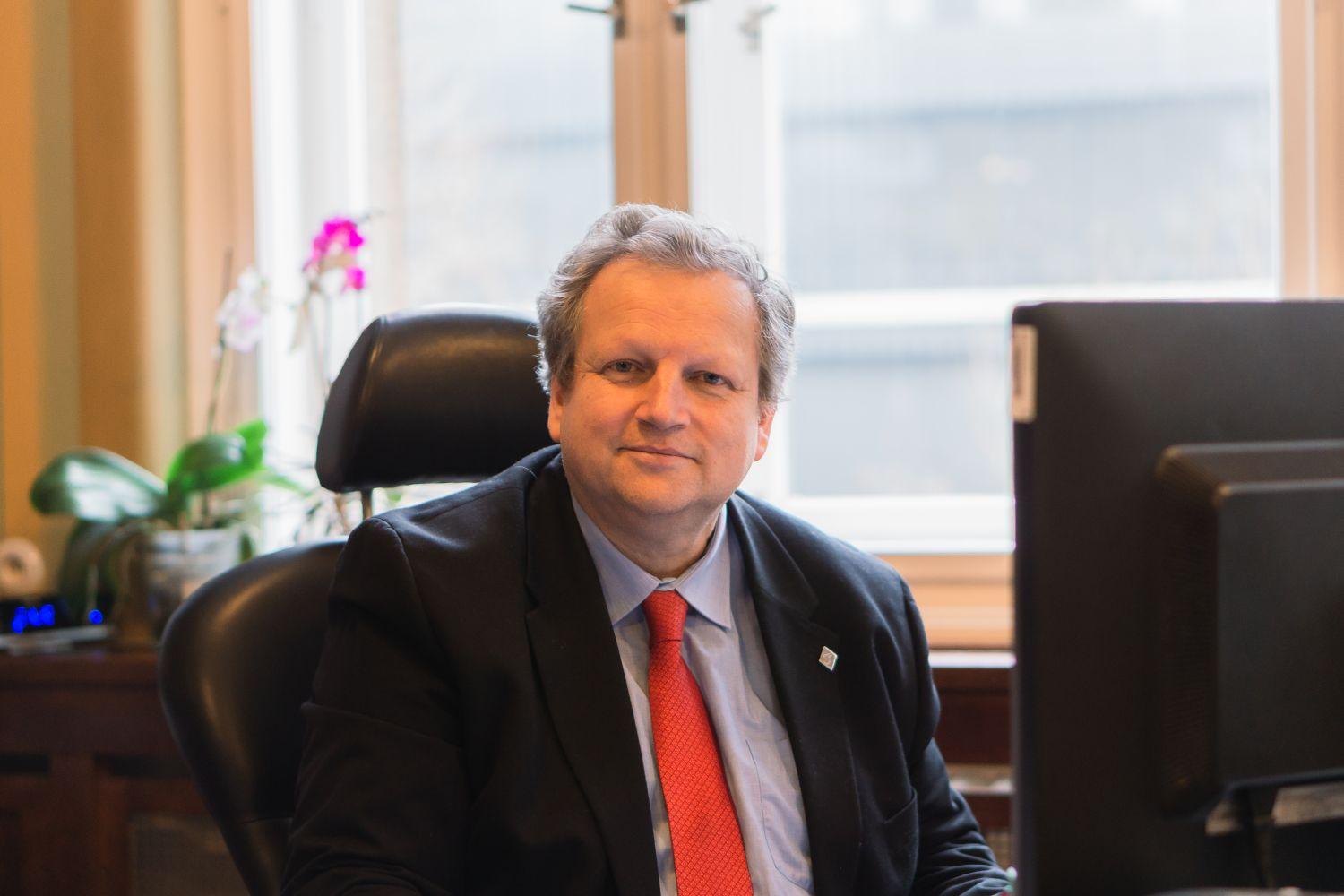
The 2023 budget: higher basic salaries and scholarships were our priority
An interview with prof. Pavel Matějka, rector of UCT Prague.
The Academic Senate and Board of Trustees have given the green light to the 2023 budget. Was it difficult to prepare and to get it approved?
Preparing the 2023 budget was complicated by inflation and tricky predictions about budgetary amounts. We started putting the budget together last fall, and discussion regarding its particular components was very intense, especially with the Academic Senate’s Economy Committee and the Deans of the faculties. Based on these discussions, we made a number of modifications, and so the conclusion of an agreement with the Deans and approval of the budget by the Academic Senate at the end of May went quite smoothly.
Have any fundamental planned expenditures been excluded from the budget?
No, but we generally have been very careful in investing in university-wide activities and in creating the operating funds budget for workplaces across the university. For 2023, we tried to improve salary conditions for employees as well as scholarships for doctoral students, thus compensating for inflation as much as we could. The share of personnel-related expenditures in the budget has increased over the years. We managed to increase base salaries for employees by 2,300 CZK/person in order to sufficiently assist employees in the lowest salary levels (as opposed to a general percentage-based increase). At the same time, we kept the adjustable components of salaries at the existing level. The stipend for doctoral candidates increased by 1,400 CZK (net amount).
So funds for the increase in personnel expenses came from the investment and operations budgets?
Yes, but we were sensitive about savings and did not cut standard investments for essential equipment/labs or allocations for computing and information-related services .
Did the government help universities cover the cost of inflation by increasing funding?
No. Institutional funding does not cover the cost of inflation and research grants typically do not account for inflation. In other words, we had to deal with inflation ourselves. Saving on energy, optimizing work processes, and concluding several successful transformational contract negotiations with academic publishers helped. Aside from activities related directly to teaching and research, only necessary expenditures were approved in the budget.
The Czech government is preparing austerity measures which, despite the government’s official Policy Statement, might affect the educational and R&D sectors. The government is, among the other cuts, discussing reducing of the compensation rates for public sector employees. If the proposal were to pass in its current form, would this mean that UCT Prague salaries would be reduced?
Basically no: at UCT Prague, we have salaries, not state-regulated compensation rates. If, of course, the Ministry of Education must cut expenses drastically, the Ministry would logically try to cut non-mandatory expenses, which unfortunately includes contributions to the educational activities of public universities. If this happens, we will have a big problem. Likewise, if Czech Science Foundation and Technology Agency of the Czech Republic funding were to be significantly reduced, it would be problematic. We are already keeping operating costs to a minimum and we are also prudent in our investments. I can’t imagine that with current levels of inflation that we would need to cut employee salaries. I would try to find any other means to cover any potential budgetary shortfalls, including a reduction of the total number of positions. However, I would like to emphasize that we are talking about a hypothetical, extreme situation, which is not currently on the horizon.
Isn’t UCT Prague currently facing a reduction in staff?
I do not have May-June data at my disposal, but can say that in 2022, nothing extraordinary happened; changes in the total number of employees fluctuated around the usual 1-2%.
In addition to inflation, energy prices were a hot topic last year.
Last year, we competed for energy supply contracts under very favourable conditions, even compared to other universities. This year, market prices are lower than in the second half of last year, but this does not mean that it’s time to stop prudent operations and to abandon the quest to find ways to reduce energy consumption.
Are there any exceptional investments awaiting us in the second half of 2023?
Investments in laboratory equipment related to UCT Prague’s involvement in the National Institute of Virology and Bacteriology and in biochemical laboratories for students, which we urgently need, are extraordinary, but not exceptional. We are also preparing steps for further construction activities.
How would you characterize UCT Prague’s financial outlook in the medium term?
UCT Prague is financially stable, over the long term. We traditionally plan the budget with rational caution, and for things that are difficult to estimate, we prefer to plan for the worst in terms of expenditures and income. During the year, we carefully monitor budgetary spending and we react flexibly as the year unfolds. However, we would significantly feel cuts from the Ministry and/or national grant agencies. Together with the other Rectors and the Council of Universities, we will do everything to ensure that higher education funding does not nominally decrease. It is obvious that the Office of the Minister of Science, Research, and Innovation (including its proposals to increase R&D funding) has a different option than the Ministry of Finance. Let’s hope that the Ministry of Education, Youth, and Sports will advocate for public universities. If even a modest increase in research or education funding could be negotiated, it would be an extraordinary success.
In June, UCT Prague’s positive social environment initiative was launched, bringing with it the possibility of consultation and notification services for situations that appear to run against the ethical principles of our university. Were recent cases at other universities the reason why these services were launched?
After our Ethics Committee was created a few years ago (together with the upgrade of the Code of Ethics), we felt that, following discussions with students, employees, and the Counselling and Career Centre, another step was needed to ensure and keep fostering a positive social environment at UCT Prague. The process took longer than I would have liked, but on the other hand, we wanted to be sure that the system would work properly, that it was safe for everyone involved, and that it would allow issues to be handled efficiently and discreetly. Cases at other universities therefore rather sounded the alarm that we could not delay the launch of our initiative any longer. There are many reasons that could lead to inappropriate behaviour at universities. I am glad that we have made it clear that UCT Prague does not intend to tolerate actions with the potential of disrupting UCT Prague’s friendly (something that is rare, in my opinion) work/study environment and academic community activities. I am convinced that the new system will also have a significant preventive effect.
Experiences from around the world and from various sectors show that such a system must above all be safe and trustworthy. Can you guarantee that this will be the case here at UCT Prague?
Of course, nothing in the world is 100% certain, and as a scientist, I object to such simplification. However, I will state with a clear conscience that independent experts participated in the preparations for the initiative, and that its launch was mainly delayed in order to ensure flawless functionality while maximizing safety and protection measures for whistleblowers. For me personally, UCT Prague’s contact person, Klára Muzikářová, with her outstanding career profile and professional competence, is also reassuring.
Five architectural proposals for the development of Vítězné náměstí were recently published. Do you have a favourite?
I like some proposals more, others less, but the international jury will decide. We are represented by Vice Rector Milan Pospíšil as UCT Prague’s institutional jury member, with his substitute being architect Petr Šichtance. What a design looks like in a picture is one thing, but what is important is a detailed and functional solution so that we can build and efficiently operate the building according to our own vision. In theory, we could look for other proposals, but that would be stepping on very thin ice, with a series of negotiations involving all parties and incurring considerable financial costs to us. I believe, though, that there will be consensus on the jury’s recommendation and that we will build the complex in accordance with the public, the Prague 6 City District , and the private investor that will meet our needs.
If you had to make a rational guess: when will the new UCT Prague building be built?
The mayor of Prague 6 mentioned that he estimates that implementation will take up to 10 years. I am more of an optimist and hope for approval in 2028.
The 22/23 academic year will end soon. What was it like, from your perspective as Rector?
In my term as Rector, this was finally the first complete year without COVID measures, which had a positive impact on the process of education and a renewal in UCT Prague community life. I think that the financial savings that we implemented did not impact the quality of education, which is not entirely self-evident. We faced, and actually still face, a very difficult external situation, which has brought me and a number of my closest collaborators quite a few sleepless nights.
I am convinced that despite partial hiccups, the benefits of renovating the building which housed the former Dean’s and Rector’s offices have been shown. With the renovated spaces, conditions for the scientific councils of the faculties, for the defense of dissertations, and so forth, have improved significantly. Further improvement were made for individual departments of faculties, which improved their research and educational environments. I also consider the general evaluation of study programmes at all levels (Bachelor to doctoral) to have been beneficial. Not that everything was positive, but we didn’t run into any major obstacles and we found out what needs to be improved.
Anything you with to mention about the next academic year?
The Faculty of Environmental Technology is celebrating its 70th birthday, so there will be an opportunity to reflect on the faculty’s teaching and research activities. From my point of view, these are topics that are absolutely essential for the future of us all. Furthermore, the important Programme Johannes Amos Comenius (OP-JAC) proposal results will be announced, and new calls for proposals can be expected. We will see how the senseless proposal for 50% co-participation by Prague universities in OP-JAC turns out, because if this outrageousness passes, we can forget about involvement in operational programs. Of course, we are also waiting for the final form of the government’s austerity measures, and we will try to influence the government’s priorities and act objectively, but strongly, together within the framework of the Czech Conference of Rectors and the Council of Universities.
But I do not want to burden UCT Prague’s academic community with that now. I would like to wish all students and staff enjoyable summer holidays and hope that everyone takes a break from their worries to recharge their batteries. I hope that in a few weeks we will all return in good health and with a positive attitude in our common endeavour to take our university one step further in embracing the spirit of European values related to university autonomy and social responsibility.







